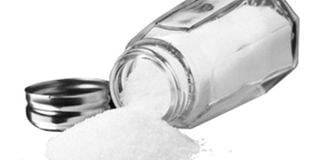Adding extra salt is dangerous

Sodium can also be obtained from processed foods, vegetables, dairy products, beverages, meat and other foods.
What you need to know:
- Kezaabu recommends eating natural and fresh foods such as bananas and vegetables such as spinach cucumber, pumpkin seeds, Soy, cheese, celery, olives and Swiss chard that are good sources of sodium.
Even before tasting the food, she adds salt to her food. “Whenever I eat food cooked by someone else, I do not feel the salt so I just add,” was Patience Nankya’s reason for adding extra salt. There so many other people that actually add extra raw salt to their food.
Salt is a combination of sodium and chloride and is the major source of sodium for the body. Sodium can also be obtained from processed foods, vegetables, dairy products, beverages, meat and other foods.
According to Bridget Kezaabu, a freelance nutritionist, although sodium is consumed by the body in very little quantities, it helps to maintain the body’s blood pressure and too much or too little of it is harmful to your body. The amount of sodium needed by a person in a day depends on their level of blood pressure.
Why is too much salt bad?
Kezaabu says, “Eating salt raises the amount of sodium in your bloodstream and wrecks the delicate balance, reducing the ability of your kidneys to remove the water. The result is a higher blood pressure due to the extra fluid and extra strain on the delicate blood vessels leading to the kidneys.”
High salt intake increases the risk of developing high blood pressure. This puts you at a greater risk of developing diabetes, high blood pressure and heart diseases, osteoporosis, kidney stones, heart disease and stroke.
“High consumption of salt will cause your blood pressure to increase. This explains why people with hypertension are advised to take very little or no salt at all. They are also likely to develop heart diseases,” she says.
In some people, excess sodium leads to fluid retention. This water retention causes swelling of the body and the heart has to work harder by pumping harder, leading to high blood pressure.
A diet high in sodium content can disrupt the function of the kidneys and cause high blood pressure; this in turn puts a strain on the kidneys leading to kidney disease.
A high salt diet can also cause existing kidney disease to progress faster.
Kezaabu warns that many people have had the habit of adding raw salt to their food but this is not good. It increases one’s possibility of developing goitre- a condition where one’s throat (neck area) swells and it can only be treated by surgery.
“Adding raw salt to your food increases the risk of developing goitre. When cooking, try to use a little salt as possible. Junk foods such as chips are usually very salty which increases your risk of taking too much salt and the complications associated with it,” she says.
Improved digestion
Kezaabu recommends eating natural and fresh foods such as bananas and vegetables such as spinach cucumber, pumpkin seeds, Soy, cheese, celery, olives and Swiss chard that are good sources of sodium.




